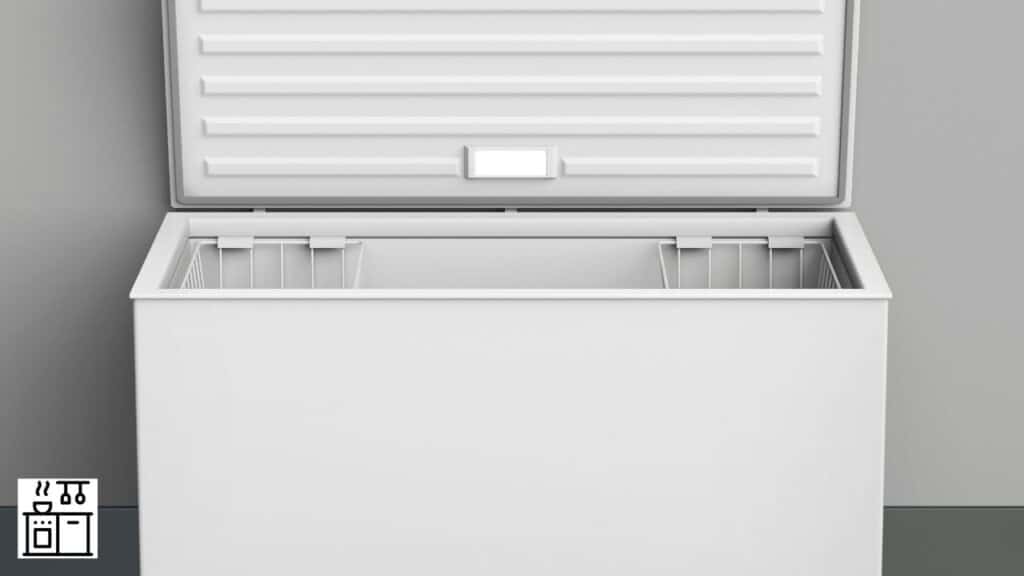Freon is a chemical compound with the unique ability to reduce temperatures below freezing point. That’s why it would be a good coolant for refrigerators and freezers. However, the usage of this hydrocarbon leads to significant environmental problems. So, do freezers use freon?
Modern-day freezers manufactured after 2010 don’t use freon because these appliances have to comply with the Clean Air Act. This regulation restricts the usage of several harmful chemicals, including freon. However, if your freezer was manufactured before this, it’s likely to use freon for cooling.
Let’s talk about this in more detail now.
- What Exactly Is Freon?
- What Role Does Freon Play In Refrigeration Systems?
- The Problem With Freon
- Do All Freezers Use Freon?
- How Do You Find Out If Your Freezer Uses Freon?
- What Problems Will You Run Into If You Have A Freon Freezer?
- How Long Does Freon Gas Last In A Refrigeration System?
- How Can You Safely Discard A Freon Freezer?
What Exactly Is Freon?
Freon is the brand term for refrigerants and aerosols manufactured by the Chemours company.
These refrigerants are basically halocarbons, which include both chlorofluorocarbons (CFCs) and hydrochlorofluorocarbons (HCFCs).
None of these halocarbons exist naturally. They are entirely manmade.
What Role Does Freon Play In Refrigeration Systems?
Old refrigeration systems used toxic gases like ammonia and SO2 as coolants.
Later, freon replaced these refrigerants and gained wide popularity as a cooling agent.
Compared to ammonia and SO2, freon was non-toxic, odorless, colorless, and inexpensive.
So it made refrigerators a lot safer.
Freon has an exceptionally high heat capacity, allowing it to cool rapidly below freezing temperatures.
So it’s an excellent refrigerant solution. CFCs were also used as aerosol propellants and foam blowing agents.
In a freon-based refrigerator or freezer, freon runs through copper tubing in the sides and back of the appliance.
It’s kept in a pressurized and contained system and is restricted to the cooling lines.
During the operation of the freezer, freon changes from liquid to vapor and vice-versa.
It removes heat from the compartment as it changes from one state to another.
By removing the heat from the food and air inside the refrigerator, freon cools the temperature.
It makes it drop below freezing point.
Recommended Further Reading:
- Does a Mini Fridge Come with a Freezer?
- How Much Amperage Does a Freezer Require?
- Will Freezers Work In Cold Garages? [Which Freezers Work?]
The Problem With Freon
Soon after freon was discovered, refrigerator manufacturers switched to it.
So it became the most commonly used refrigerant in cooling systems.
However, the environmental impact of freons came to light by the mid-1970s.
When people used freon refrigerators, CFCs were released into the atmosphere.
These CFCs would rise to the stratosphere and break up to release chlorine molecules.
Now, did you know that a single chlorine atom can destroy thousands of ozone molecules?
This chemical activity turned out to be the source of severe environmental damage.
Freon played a significant role in the depletion of the ozone layer.
It led to widespread damage to the ozone layer, causing worldwide climate changes.
There was a significant increase in global warming, and dangerous skin diseases like cancer became very common.
All these problems made us realize that the overall risk of using halocarbons in freezers and other cooling systems outweighs their benefits.
So it became necessary to stop the use of freon and other traditional halocarbons.
As per environmental guidelines, refrigerator manufacturers had to eliminate freon from their systems and switch to more environment-friendly refrigerants.
They had to redesign their refrigerators without halocarbons to receive approval for manufacturing them.
Over time, CFC and HCFC refrigerants were gradually phased out of production.
New refrigerator and freezer designs use benign refrigerants instead of freon for cooling purposes.
Modern refrigerators use refrigerants like HFC-134a instead of freon.
Do All Freezers Use Freon?

Freon was discovered in the 1930s and made its way into the refrigeration and cooling industry in the 1960s.
It continued to be the coolant of choice for almost all refrigerators and freezers manufactured till the 1990s.
Once the environmental impact of using freon in refrigerator systems came to light, strict measures were taken to discontinue its use.
That’s why the appliances manufactured after 1994 would no longer use freon.
The production of CFCs stopped in 1995, and HCFC production was also reduced till it eventually stopped.
So equipment that used these refrigerants would soon become obsolete.
Refrigerator and freezer manufacturers redesigned their systems to use benign or inert refrigerants instead of freon.
Almost all freezers manufactured before 1995 used freon as their refrigerant.
However, modern refrigerators no longer use freon.
How Do You Find Out If Your Freezer Uses Freon?
If your freezer is an old appliance manufactured before 2000, it may have freon.
You can check by looking at the nameplate. It will mention the refrigerant being used.
Another way to check if your freezer contains freon is to unplug it and listen carefully against the side.
Ensure that the temperature control is also off.
An old freon-based system will produce a gurgling or hissing sound. This is absent in newer freezers and refrigerators.
A freon leak may occur if you pry open or puncture the tubing on your freezer.
Improper scraping of ice off the surface can also lead to a freon leak.
If you suspect that there’s a freon leak, you can use a leak detection kit to check.
This is usually readily available at electrical appliance shops.
When freon leaks, the efficiency of the appliance is compromised.
The motor will switch off and on randomly. This can cause the food to spoil.
Improper operation can also make your freezer compressor work extra hard, which will drive up your energy consumption bills.
Related Further Reading:
- Do Freezers Produce Heat? (Where Does The Heat Come From?)
- Do Fridges Have Fuses?
- Can Dishwashers Catch Fire? [5 Reasons They Catch Fire]
What Problems Will You Run Into If You Have A Freon Freezer?
If you have a freon freezer, you may end up with two main problems. Firstly, freon systems are out of production.
So, you may have trouble getting it repaired if it presents a problem.
Another factor is that your freon freezer can become an environmental and health hazard.
Although freon is supposed to stay inside the compressed and contained coils, it can leak as the appliance grows old.
When it does, it contributes to the existing ozone depletion problem.
Freon is not known to have any long-term health consequences. It is not a carcinogen or mutagen.
However, freon can cause serious side effects during the exposure period.
Freon leaks can cause irregular heartbeat and palpitation in people with poor cardiac history.
How Long Does Freon Gas Last In A Refrigeration System?
Freon in freezers and refrigerators runs through concealed coils inside the walls.
These systems are built with enough freon to last their lifetime. Unless a leak occurs, the freon should last forever.
Nevertheless, freon-based freezers will be very old and prone to wear and tear.
They can develop cracks and cause refrigerant leakage.
Should your freon freezer develop a leak, it’s not advisable to repair it. Replace it instead.
Improperly discarded freon freezers can become an environmental hazard.
So you should check with qualified and authorized personnel to dispose of your appliance safely.
Interesting Further Reading:
- How Quickly Does a Refrigerator Cool Down?
- Can Dishwasher Pods Go Bad? + How To Store Them Properly?
- Does a Reset Button Exist on Refrigerators?
How Can You Safely Discard A Freon Freezer?
The Clean Air Act makes it mandatory to recover all CFC and HCFC systems when they are past usage.
Only EPA-certified service personnel are equipped to handle freon-based refrigeration systems and dispose of them without causing harm to the environment.
If you are still using a freon-based freezer, it’s only a matter of time before you must upgrade to freezers with natural refrigerants.
Make sure that you contact EPA-certified service personnel to dispose of your old unit safely.
When buying a new freezer, avoid buying equipment that uses HCFCs since they will also become obsolete soon.

